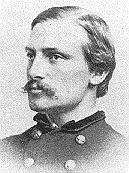Edward Needles Hallowell facts for kids
Quick facts for kids
Edward Needles Hallowell
|
|
|---|---|

Edward Needles Hallowell
|
|
| Born | November 3, 1836 Philadelphia, Pennsylvania |
| Died | July 26, 1871 (aged 34) Medford, Massachusetts |
| Place of burial |
Mount Auburn Cemetery
Cambridge, Massachusetts |
| Allegiance | |
| Years of service | 1862 – 1865 |
| Rank | |
| Unit | 20th Massachusetts Volunteer Infantry |
| Commands held | 54th Massachusetts Volunteer Infantry |
| Battles/wars | American Civil War - Seven Days Battles - Battle of Antietam - Battle of Fredericksburg - Second Battle of Fort Wagner - Battle of Olustee - Battle of Honey Hill - Battle of Boykin's Mill |
| Awards | |
Edward "Ned" Needles Hallowell (born November 3, 1836 – died July 26, 1871) was a brave officer in the Union Army during the American Civil War. He became famous for leading the 54th Massachusetts Volunteer Infantry. This was a special regiment made up of African-American soldiers. He took command after Colonel Robert Gould Shaw died in the Second Battle of Fort Wagner in 1863.
Contents
Edward Hallowell's Early Life
Edward Hallowell grew up in Philadelphia, Pennsylvania. His family belonged to the Quaker faith. Quakers believed in peace and equality for everyone. Edward's father, Morris Hallowell, was a successful businessman. He imported silk from countries like India and China.
A Family Against Slavery
Edward's father was also a strong abolitionist. This meant he was against slavery and worked to end it. The Hallowell family actively helped enslaved people. Their summer home was even a stop on the Underground Railroad. This was a secret network that helped enslaved people escape to freedom.
Edward and his brothers and sisters shared their parents' views. His brother, Richard Price Hallowell, helped choose officers for the 54th Massachusetts. This shows how dedicated the family was to fighting for freedom. Before the war, Edward worked as a stockbroker. After the war, he became a wool merchant. He had two children with his wife, Charlotte.
Edward's Civil War Service
In 1862, Edward joined the Union Army. He became a lieutenant, serving alongside his brother, Norwood Penrose Hallowell. They were both part of the 20th Massachusetts Volunteer Infantry. This regiment fought in many important battles. These included the Seven Days Battles, the Battle of Antietam, and the Battle of Fredericksburg.
Leading the 54th Massachusetts
Later, Edward joined the 54th Massachusetts. This new regiment was special because it was made up of African-American soldiers. Robert Gould Shaw was chosen to lead it as colonel. Edward's brother, Norwood, became the lieutenant colonel. Edward helped recruit African-American soldiers in Philadelphia. He was the first officer to arrive at Camp Meigs, where the 54th trained.
So many African-American men wanted to join that a second regiment, the 55th, was formed. Norwood Hallowell became the colonel of the 55th. Edward was promoted to major and became second-in-command of the 54th, working closely with Colonel Shaw.
Heroism at Fort Wagner
Edward was promoted to lieutenant colonel before the famous attack on Fort Wagner. During this battle, he led half of the regiment. The soldiers had to pass through a narrow path to reach the fort. Edward was right behind Colonel Shaw. He was wounded three times during the attack. He went home to recover from his injuries.
After he recovered, Edward returned to lead the 54th as a full colonel. He commanded the regiment for the rest of the war. Sometimes, he even temporarily led a larger group of soldiers called a brigade.
Continued Service and Victories
The 54th Massachusetts and Colonel Hallowell continued to serve with bravery. They fought in battles like the Battle of Olustee, the Battle of Honey Hill, and the Battle of Boykin's Mill. At Boykin's Mill, Hallowell was in charge of a brigade. When the city of Charleston fell, the 54th was there. They occupied important Confederate forts like Fort Sumter and Fort Wagner. They also guarded Confederate prisoners of war. Some of these prisoners were soldiers they had fought against at Fort Wagner.
After the War
Edward Hallowell left the Union Army on August 20, 1865. He marched with the 54th Massachusetts in a victory parade in Boston in December 1865. In 1866, President Andrew Johnson honored Hallowell. He was given the honorary rank of brevet brigadier general. This award was for his "meritorious services" during the war.
After the war, Edward went back to Medford, Massachusetts. He became a wool merchant. Sadly, his war wounds likely shortened his life. He passed away in 1871. He is buried with his wife, Charlotte, at Mount Auburn Cemetery in Cambridge.
Edward Hallowell's Legacy
The character of Major Cabot Forbes in the movie Glory is partly based on Edward Hallowell and his brother. While there isn't a lot of public recognition for Edward or Norwood, they are remembered in some places. For example, the Union Club in Boston has meeting rooms named after Edward, Norwood, and Robert Gould Shaw.
 | Selma Burke |
 | Pauline Powell Burns |
 | Frederick J. Brown |
 | Robert Blackburn |

